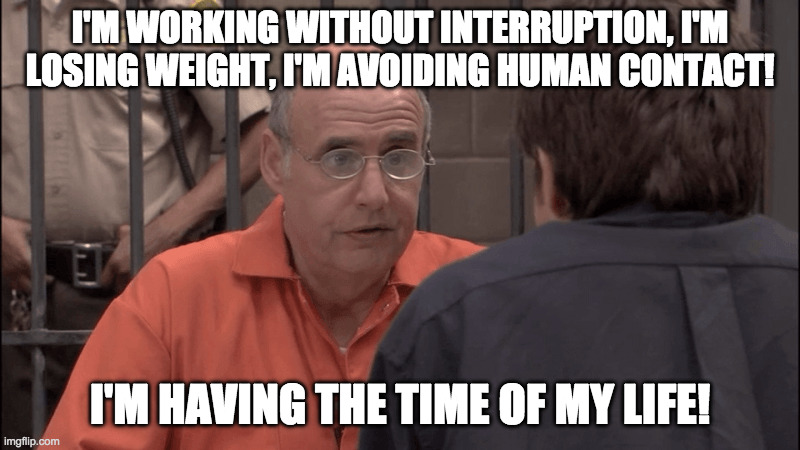It was super easy to tell this. They are ideologues who think when Dem does it bad, when Rep does it good*. *Do not take this as precedent
The tipping point was 2016. I was telling people that no matter what, their vote should be about the Supreme Court. That its majority was going to be locked during that 2016-2020 term. A Clinton win and it would have gone liberal. A Trump win and it was gonna be a kangaroo court. There was just no way to anticipate Trump would get to pick 3 justices in 4 years.
When RBG died, I made the point that the court had not tipped with her death or it had tipped long before. Based on what we now know, it’s very obvious the court was gone long before she died and the rest was just performance art. It really died when Trump got Kennedy to retire. It’s really simple, they should expand the SC to 13 justices to match how many appellate courts there are. Just say, ‘the workload is too heavy, sorry’.
Again I’d ask for evidence he is running to avoid prosecution. It sound logical but I don’t think there is any evidence to support it. He is running because he is a narcissist who wants to be a dictator.
Wat
To be fair my favourite SCOTUS podcast on slate was convinced this was the week they couldn’t possibly back trump. They were shocked. It includes Marc Joseph Stern who is a widely respected SCOTUS watcher.
Well, it could be that too. But I’m afraid I’ll have to ask for evidence.
Um he did an insurrection!
For which he faces consequences which he wants to avoid by winning an election. I’ll count that as evidence.
We expected an extremely conservative court. Not a kangaroo court. Judges are usually impartial and they’ve ruled against Trump before. There was no reason to think they were gonna make such an asinine ruling
He didn’t want to win the first one. It was all a gimmick to increase his brand, but too many idiots took him seriously and he won. He wants money and fame. To the extent the presidency gives him that, he’ll take it. But he’s absolutely running to stay out of jail
The idea judges are impartial is the foundational myth of the legal system.
I generally agree although there are people that will vote R for tax cuts unless Ds offer them something tangible that they want really bad (like Obama did with healthcare).
It’s the death threats.
Bush v Gore would be my first cite here. Also see Citizens United, Shelby County v Holder, WV v EPA to name a few more. From the founding the court has always been political, it’s just had better branding in the past.
Political, yes. But serious crimes have been committed and they are literally aiding and abetting a criminal here
Ah but crimes were only committed if the President doesn’t have absolute immunity which they’re looking into very strongly. Chessmate!
This stuff is where ChatGPT is in its element. Vague poorly defined questions.
–
ChatGPT
- Charles de Gaulle (France): De Gaulle was a key figure in the French resistance against Nazi Germany during World War II. After the war, he headed the provisional government but resigned in 1946 due to political disagreements. In 1958, during the Algerian crisis, amidst fears of a civil war, de Gaulle was invited to return to power. He led a government under a new constitution (founding the Fifth Republic), which significantly strengthened the presidency. Although this wasn’t a coup in the traditional sense, de Gaulle’s return was precipitated by a complex political situation that some liken to a coup. He was then elected President in 1959, serving until 1969.
This scenario is a bit unique as it involves complex political maneuvers rather than a straightforward military coup, but it effectively illustrates a leader returning to power through more legitimate means after a period of political instability.
ChatGPT
-
Mathieu Kérékou (Benin): Kérékou first came to power in 1972 after a coup. He ruled as a military dictator and then as a civilian president after declaring the country Marxist-Leninist. He lost power in 1991 when he was defeated in Benin’s first free and fair election but was surprisingly elected again in 1996 and re-elected in 2001.
-
Jerry Rawlings (Ghana): Rawlings first came to power in 1979 after a coup, handing power over to a civilian government soon after. Later that year, he took power again in another coup. He eventually resigned from the military, won the 1992 presidential election, and was re-elected in 1996.
-
João Bernardo Vieira (Guinea-Bissau): Vieira first seized power in a coup in 1980. He was ousted in 1999 during a civil war but was later elected as president again in 2005. Unfortunately, his return to power ended tragically when he was assassinated in 2009.
-
Muhammadu Buhari (Nigeria): Buhari first came to power in a military coup in 1983. He was deposed in another coup in 1985. Decades later, he re-entered politics as a civilian and was elected President of Nigeria in 2015, re-elected in 2019.
-
Alpha Condé (Guinea): While not directly returning after a coup, Condé’s political career is notable. He spent decades in opposition, at times imprisoned, before being elected in 2010. His presidency, however, ended with a military coup in 2021.
-
Andry Rajoelina (Madagascar): Rajoelina took power in 2009 after a political crisis involving a transfer of power that was characterized by many as a coup d’état. He was not eligible to run in the immediately following elections due to agreement terms but later won the presidency in the 2018 elections.
Quite the list of countries in that group for America to join.
Indeed. But that’s a good conclusion to draw. That US is not uniquely safe from coup, revolution, and violence, and you should look elsewhere for understanding of risk and best practice.

